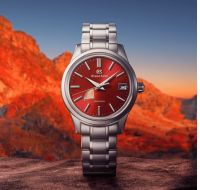No results for your search

Omega Speedmaster Watches
Speedmaster Moonwatch
Speedmaster Moonwatch Sedna gold 42 mm
Speedmaster Moonwatch Canopus gold 42 mm
Speedmaster Chronoscope Mechanical 43 mm
Speedmaster Moonwatch Co-Axial Master Chronometer Or Moonshine 42 mm
Speedmaster Chronoscope Mechanical 43 mm
Speedmaster Chronoscope Mechanical 43 mm
Speedmaster Chronoscope Mechanical 43 mm
Speedmaster Chronoscope Mechanical 43 mm
Speedmaster Moonwatch
Speedmaster Moonwatch Canopus gold 42 mm
Speedmaster Moonwatch Calibre 321 39,7 mm
Speedmaster Moonwatch Team Alinghi 44,25 mm
Speedmaster Moonwatch
Speedmaster Moonwatch
Speedmaster Moonwatch
Speedmaster 38
Speedmaster 38
Speedmaster 38
Speedmaster 38
Speedmaster 38
Speedmaster 38
Speedmaster 38 mm
Speedmaster 38
Speedmaster 38
Speedmaster '57 Co-Axial Master Chronometer 40,5 mm
Speedmaster '57 Co-Axial Master Chronometer 40,5 mm
OMEGA steel buckle deployment 16mm
NASA Speedmaster Moonwatch VELCRO Bracelet
Rubber strap Speedmaster 20 mm
NASA Speedmaster Moonwatch VELCRO Bracelet
Speedmaster Chronoscope "Paris 2024" Olympic Games Mechanical 43 mm
Speedmaster Chronoscope "Paris 2024" Olympic Games Mechanical 43 mm
Speedmaster Chronoscope "Paris 2024" Olympic Games Mechanical 43 mm
Speedmaster Moonwatch Sedna Gold 42 mm
Fall under the spell of the iconic OMEGA Speedmaster collection, arguably the most famous chronograph on Earth and beyond. Chosen by NASA in 1965 for all of its manned space missions, it has participated in some of the world's greatest space expeditions, including becoming the first watch worn on the Moon during the Apollo 11 mission in 1969.
The Speedmaster story begins in 1957 when Omega launched a trio of watches consisting of the Omega Seamaster 300 (CK2913), the Omega Railmaster (CK2914) and the Omega Speedmaster (CK2915), which have since become icons of the brand and the world of watches as we know it today. The Speedmaster was originally conceived as a sports chronograph inspired by the dashboards of Italian sports cars of the late 1950s. When it was launched, the Speedmaster was the world's first wrist chronograph with a tachymeter scale on the bezel instead of printed on the dial, a very useful development for racing drivers. Since its release, the Speed has gone through some 250 different variations over nearly six decades. It's a line that has left a deep impression, to say the least.
These hundreds of iterations have presented numerous evolutions and lines marked by both aesthetic and technical differences. While the calibers have been perfected over time, Omega has also offered a wide choice of movements (manual, automatic, moon phase, tuning fork, split-seconds, perpetual calendar, co-axial escapement) as well as digital quartz or hybrid multifunction quartz models. The cases themselves have been varied: steel, gold, titanium, in jewelled versions or with transparent backs. They have also changed diameter during its life. The Speedmaster is a true icon!
The Speedmaster and space exploration
For over fifty years, the Omega Speedmaster has been the preferred choice of astronauts and space agencies. Associated with some of humanity's most extraordinary extra-terrestrial adventures, it has been among the most famous watches on the planet since July 1969 when it became the first watch to be worn on the moon.
But why is the Speedmaster a space exploration legend? No one could have foreseen the incredible destiny that awaited the Speedy!
Indeed, the history of the Speedmaster took a radical turn in 1964, when NASA wanted a wrist chronograph capable of withstanding space conditions. NASA purchased several chronographs, including the Omega Speedmaster. The watches were then put through a series of rigorous tests to determine whether or not they were suitable for spaceflight. Although there was a lot of competition, only the Speedmaster passed all of the space agency's draconian tests: extreme temperatures, shocks, vibrations, accelerations, humidity... The watch was thus approved as the official timepiece for astronauts on NASA's space expeditions. It was officially approved in 1965 by NASA for all its manned missions. Since then, its role during the six lunar landings has earned it the nickname "Moonwatch".
But the legacy of the OMEGA Speedmaster lives on, especially since July 21, 1969, when it became the first watch ever worn on the moon by Buzz Aldrin! To commemorate this extraordinary feat, the Speedmaster is engraved on the bottom of its case: "The first watch worn on the Moon". But it is important to know that the Speedmaster has participated in many space adventures before setting foot on the Moon. The first flight of the CK2998 Speedmaster model was on the wrist of Walter Schirra in 1962 as part of the Mercury Atlas 8 mission. The Speedmaster also accompanied the first spacewalk in history on the Gemini 4 mission and was awarded the Silver Snoopy Award for being of crucial importance to the Apollo 13 mission.
The Omega Speedmaster Moonwatch : a chronograph that saves lives
Not all watch manufacturers can claim that their watches have saved lives. Omega, however, has done just that, as the Speedmaster has saved the lives of three astronauts and prevented a fatal collision between two spacecraft. The Speedmaster's technical capabilities have been proven many times in extreme conditions, such as the emergency landing of the Apollo 13 mission in 1970. Shortly after the launch of the mission, an oxygen tank exploded and damaged the spacecraft. The pilot at the controls, John L. Swigert, used his Speedmaster watch to calculate the exact time to ignite the return engine and allow the space shuttle to re-enter the Earth's atmosphere. It allowed the crew to land safely on Earth. The Speedmaster received the Snoopy Award, given by NASA for outstanding achievement in human spaceflight safety and mission success. In recognition of the Speedmaster's outstanding performance, Omega has launched special editions of this legendary timepiece. Today, the cooperation between NASA and Omega is still strong and the Speedmaster Professional is still a standard piece of equipment for American astronauts.
Reliability and innovation
The Manufacture of Bienne is known to propose many revolution in the world of mechanical watchmaking! And the Speedmaster collection is no exception!
In 1999, the brand launched its first Co-Axial caliber, which features the first functional escapement developed for a mechanical watch in 250 years. Invented by George Daniels in 1974. It revolutionizes the basics of mechanical watchmaking. Simplified, more stable, more regular, it requires less maintenance because it minimizes contact surfaces and reduces friction. It requires less lubrication, which makes it more reliable than traditional movements. Miniaturized and industrialized, it now equips the vast majority of Omega Speedmaster models!
The Omega brand also launched a new standard, the Master Chronometer certification in 2005! It ensures that the watch has been tested not once, but twice! The caliber passes 8 demanding METAS tests that the watch must overcome to earn the title of Master Chronometer only after a first certification of the movement by the COSC (Contrôle Officiel Suisse des Chronomètres). And the testing process is completely transparent. To find out the exact results of the watch in the 8 METAS tests, simply enter its certificate number online. It guarantees better precision, anti-magnetism up to 15,000 gauss and perfect water resistance!
The Omega Speedmaster '57
When we think of the Speedmaster, we immediately think of the classic Moonwatch, the professional model that went to conquer space. But the history of the Speedmaster begins long before it was on the moon, specifically in 1957 with the appearance of the CK 2915. This watch was originally designed to support automobile teams and engineers on the racetrack. With its distinctive "Broad Arrow" hands and chronograph display, it was the first watch to feature a tachymeter scale on the bezel. Now, as part of the Speedmaster's 65th anniversary, Omega is giving the '57 collection launched in 2013 a complete makeover. On the agenda is a new Master Chronometer version with a slimmer case profile. The collection consists of eight 40.5mm stainless steel models, all with a clean look that combines historical details with new, original colors.
The Omega Speedmaster 38
The Speedmaster is one of the world's most iconic chronographs. For its 38mm collection, Omega has reinterpreted the size, colors and design of its original model while remaining true to its iconic style and heritage. This stunning line consists of several alternative models to the classic Speedmaster, which emphasizes simplicity and color in a practical format. More refined, this collection still retains all the famous details of Omega's legendary chronograph: the tachymeter scale, the seahorse medallion on the case back and the Speedmaster case with curved lugs. However, the brand has equipped this 38mm watch with several details exclusive to this line, such as oval counters, a Co-Axial automatic movement and captivating colors, which are inspired by several watches in the De Ville collection. Some of the women's watches in the collection are set with diamonds on the bezel and others come with a mother of pearl dial. For both men and women, the line comes in stainless steel, gold or a combination of both.
The Omega Speedmaster Dark Side of the Moon
Discover the Omega Speedmaster Dark Side of the Moon collection, a high-tech reinterpretation of the legendary chronograph, modernized with cutting-edge innovations and unique ceramic know-how. This line of watches from the Speedmaster collection was introduced by the Omega Manufacture in 2013 at Baselword. This modernized Speedmaster line is a game-changer, as it is the first time the legendary chronograph has been dressed in an all-ceramic case. Thus, the Manufacture revolutionized its iconic model, while highlighting the blend of its technical and watchmaking prowess. The Dark Side of the Moon models are elegant and timeless. They are inspired by the missions of NASA astronauts, who ventured into the depths of space. Indeed, the Apollo 8 astronauts were the first to see the dark side of the Moon with their own eyes. These watches feature cutting-edge technologies, in keeping with the brand's pioneering spirit and the professional Speedmaster chronographs worn by the mission's astronauts. The Dark Side of the Moon collection is distinguished from the rest of the Speedmaster collections by cases, crowns, dials and pushers crafted entirely in black, grey or white ceramic. The case finishes are remarkable, whether satin or polished, and often enhanced with touches of 18K gold or diamonds.
The Omega Speedmaster Chronoscope
Omega is returning to its vintage heritage by bringing back a name dear to the brand, "Chronoscope". This new collection takes the legendary design of the Speedmaster and combines it with the inspiration of the vintage chronographs of the late 1930s and 1940s that made the brand so successful. The neo-vintage collection has a sophisticated design, making it a unique choice among the famous Speedmaster range. For the record, long before the release of the Speedmaster in 1957, Omega chronographs often featured several scales on the dial, then called chronoscope. These watches were then devices used to observe, watch and measure precisely the duration of a phenomenon. For the record, the name Chronoscope, is also much older than that, because it was then the name of the first watch of Louis Brandt in 1885, who later founded the company Omega.
The Omega Speedmaster Racing
When it was first introduced in 1957, the Speedmaster was presented as a chronograph designed to support teams and engineers on the racetrack. This watch first excited sports car fans before making history on the wrist of cosmonaut Buzz Aldrin during his 1969 moon landing. In keeping with tradition, Omega's Racing collection offers the heritage, spirit and aesthetics of the first Speedmaster models. This range of watches evokes the racetrack, symbolized by the checkered pattern on the timer. A pattern that dates back to the first Speedmasters of 1968 and provides better legibility for race car drivers. They are therefore clearly inspired by the brand's automotive heritage, when the Speedmaster was fitted to the wrists of drivers to time their times. Whether you live at 100 km/h or take your time, you'll find a racing model to suit your pace. All cases in this line of watches are available in stainless steel, Sedna gold or a combination of both. The Speedmaster Racing collection also offers a wide choice of matte or sunray dials in simple, vibrant colors such as blue, black, gray and white. Like all Speedmasters, the iconic tachymeter bezel is included to measure your speed. For exceptional precision and performance, these retro-vintage inspired watches are powered by Co-Axial Master Chronometer movements, whose precision is matched only by their antimagnetic resistance.
The Omega Speedmaster Moonphase
Discover the Speedmaster Moonphase collection from the Swiss Manufacture Omega. A nod to the iconic chronograph that was worn on the lunar surface, this collection not only measures time, but also tracks the phases of the moon. These automatic models are a modern and poetic evolution of the legendary Omega model. This elegant and aesthetic range is also very much ahead of its time, as the Moonphase features a revolutionary advance: the new OMEGA quality standard established by METAS. Each model in the collection is certified Master Chronometer by METAS. Each Moonphase is also distinguished by its strong use of color. In addition to a wide range of ceramic dials and bezels, the cases also come in attractive materials, such as stainless steel, yellow gold, gold Sedna™ or platinum. Finally, the twin counters with two hands bring a welcome symmetry to the ensemble. For the small anecdote, we can see with attention, that the moon phase disc of most models, we can distinguish the iconic footprint left by Neil Armstrong on the Moon.
The Omega Speedmaster White
Announced in March 2024, the new Omega Speedmaster White watch is an exceptional model that pays tribute to the brand's space history. With its white lacquered dial and black and red details, this Speedmaster Moonwatch recalls astronaut suits and NASA's secret ALASKA I project. This Omega Speedmaster White watch is a first in the Moonwatch collection, which was worn on the Moon by space heroes. It joins the prestigious circle of Speedmasters with white dials, very rare and highly coveted by collectors. The Omega Speedmaster White is the new star of the world's most iconic chronograph. As of 01/03/2024 its price is 8900€.






.jpg)
.png)

